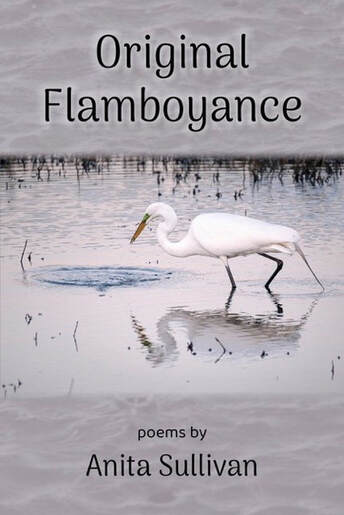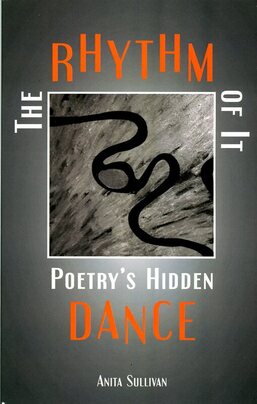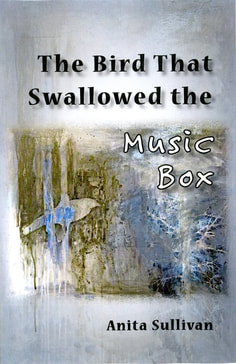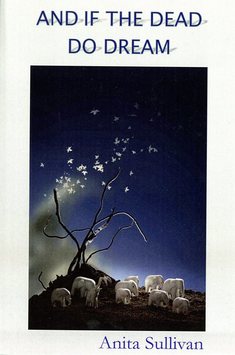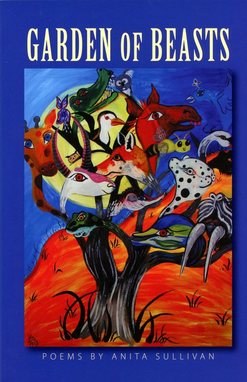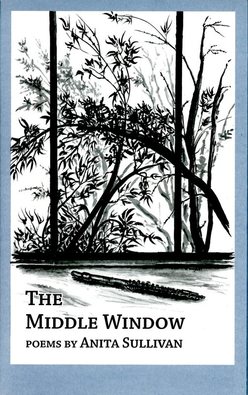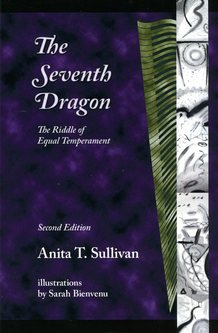We used to say ‘A Mountain Giant.’
Now we say, ‘A Giant Mountain.’. ~Anita Sullivan
Now we say, ‘A Giant Mountain.’. ~Anita Sullivan
Original Flamboyance
|
The poems in Original Flamboyance insist that flamboyance is a healthy response to well being. It's usually a temporary condition, mildly comical, which offers a set of counter-balancing emotions when someone is in a position of managing an attack of raw happiness.
In these highly original poems, birds, rats, squirrels, lions, horses, trees, spoons, waterfalls, wrecked cars, particle physics, scary dreams, and death itself all contain hidden reservoirs of flamboyance which humans might tap into if they would but recognize the codes that the poems supply. Even a single word can help you to discover – or intensify – your own original flamboyance as you break into an unauthorized giggle or mistake a bird's tummy for a map of the world.
|
|
To read Anita Sullivan's The Rhythm of It is to understand that poetry invokes and depends upon the rhythms of our being, as common to us as our own pulse and breath patterns.... Thus for Sullivan, reading and composing alike become actions of the whole body beguiled by and engaged within patters at once ancient and ever available for rediscovery.... The Rhythm of It fine tunes our sense of how good poems can inhabit us and we them--heart, mind, and soul." --LEX RUNCIMAN, author of One Hour That Morning, winner of the Oregon Book Award, the Kenneth O. Hanson Award, and the Silcox prize. |
The Rhythm of it: Poetry's Hidden Dance – offers a new insight into how rhythm works in so-called free verse poetry. The book is colloquial, not technical, guiding readers through the discoveries I made during the roughly 10 years that I puzzled over why “free verse” is not the same as “anything you would write as prose except the lines are shorter.” Instead, it may be the oldest form of poetry on the planet.
From my work as a piano tuner, I became immersed in the way musical scales are grounded in the natural proportions that result when small whole numbers combine with one another. Visually, the Earth itself does the same thing, with its myriad proportional geometries. Free verse also uses small whole number ratios in its rhythm patterns, therefore: free verse poetry is a way of sounding the geometry of the earth and the harmony of the spheres. It's language's most holy analogy. My little book is beautifully illustrated by Imelda Almqvist, who immediately “got” what I was trying to do with proportions. It's published by Shanti Arts Publishing, an independent fine-arts press in Brunswick, Maine. I urge you to order directly from the publisher: Shantiarts or through one of our local bookstores. |
"With this book, Anita Sullivan ... tunes my mind to a new temperament, enriches the way I read poetry, and jolts my own writing of it with new voltage. She shows how poems seem to present meaning but actually kindle rhythm. She reveals the ghost heartbeats inside utterance on the page and in the body. She pulls away the veil from why some poems, filled with admirable qualities, fall flat, while others, seemingly simple, electrify. ... showing how poetry works while enriching the magic we can experience in lyric text."
--KIM STAFFORD, author of Wild Honey, Tough Salt, Oregon Poet Laureate
--KIM STAFFORD, author of Wild Honey, Tough Salt, Oregon Poet Laureate
The Bird that Swallowed the Music Box
|
This is a chapbook of essays, which means a collection whose members, like inhabitants of the same village, share important common experiences, which they talk about when they greet each other on the streets.
Although the essays gently cycle around among the large themes of stories, language, music, and birds, each essay has been steeped and refined for decades in my soul's alchemical laboratory, so that the book exudes an effect of spontaneously generated unity. Check the table of contents and read them in any order. Come spend an afternoon in a quiet village, sit at a table under the grape arbor, raise a glass and join a conversation that is congenial, philosophical, tender, and informative – the way good conversation has always been. |
The Bird That Swallowed the Music Box
Anita Sullivan Shanti Arts Publishing Brunswick, Maine ISBN 978-1-947067-46-2 $14.95 |
Order from the author, the publisher-Shanti Arts, or Amazon (digital or paper), iBooks andGoogle or from your favorite independent book store.
AND IF THE DEAD DO DREAM
|
The poems in this collection, like the dark side of the moon, gently insist that our daily lives are constantly surrounded by many partially-formed alternative realities. These are versions of things that, while they never fully emerged, might have happened instead. Unconsciously, we feel the “weight” of these unrealized scenarios, which don't go away, but press in on us in a way that can enrich and expand our everyday lives if we pay attention. These poems offer a vivid array of scenes, with alternatives brought temporarily out of hiding and given a chance to be felt and recognized as either a supporting case, or a dream-like parallel reality. Read a review by A. Molotkov on goodreads
|
Ever After
|
Invoking epic and myth, classics and fairy tales, the back of C.S. Lewis's closet and the through-side of Lewis Carroll's looking glass, and drawing upon the elaborately detailed Greek architecture of her own fertile imagination, Anita Sullivan slingshots us over the rainbow, through the deep dark woods, then down the rabbit hole into a complex vision of eternal life as a sort of improvised jazz. This is a tale unlike any you've ever read, and Sullivan tells it in a prose as musical as it is richly imagistic.
~Rick Borsten (author of The Great Equalizer, and Rainbow Rhapsody) |
For anyone who's ever fantasized about immortality or wondered what may await us after death, Anita Sullivan has created an afterlife like nothing you've imagined. The characters in Ever After inhabit places of flowering gardens and villas on the Mediterranean coast, white stone cottages on Greek islands, and even rocks in rural Australia where a cave painting suddenly blooms with a bicycle. Sullivan's lucid writing takes you on a journey you'll not soon forget. But would you agree to the 'rules' of this particular afterlife?
~Gregg Kleiner (author of Where River Turns to Sky and Please Don't Paint Our Planet Pink)
~Gregg Kleiner (author of Where River Turns to Sky and Please Don't Paint Our Planet Pink)
Garden of Beasts
|
If, as I believe, every story has a poem in its heart, then these poems are the hearts of larger stories. The poems came together into this book because most of them were inhabited in some way by animals – dogs, horses, birds, and even imaginary beasts whose heads are large and out of control. Stories come from individual minds, but they also float freely in the world along a kind of universal story grid. I think it’s a good idea to add new material to this grid now and then, ancient and powerful as it remains.
|
As Anita Sullivan’s lines sing, we awaken to our own shape-shifting, our own evolving, our own stretch toward mysterious chords. In her garden, or on a Greek isle, this poet knows that every house is an entire world.
~Peggy Shumaker (author of Gnawed Bones)
~Peggy Shumaker (author of Gnawed Bones)
Ikaria: A Love Odyssey on a Greek Island
|
This is the story of a fifty-year-old piano tuner who decides to take Greek language lessons with a friend, just for fun. Unexpectedly, she contracts the ancient illness known as “Eros,” which is an unwelcome passion for someone who is not suitable for you --- i.e. the young graduate student who is teaching her. A trip to Greece seems to be the only possible cure.
She sets off one April morning for her two-month journey, not realizing that the real love affair for her will end up being the country itself. Over the next several years she returns to Greece four more times, during which she has a variety of intense experiences that take her deeper into the mystery of this place where she has become more than just a tourist. Ikaria takes its place in the fine tradition of Greek travel essay books, alongside those by Lawrence Durrell, Henry Miller, Patrick Leigh Fermor, Peter Levi, Kevin Andrews, and more recently Camille Cusumano, Elizabeth Boleman-Herring, John Lucas, Alison Cadbury and John Mole. |
The Middle Window
|
Music and light, and the ways they combine are the take-off point for the poems in this chapbook.The sound of organ music: “In the throat of the ear it drifts/not like shattered glass, but the dust/of shattered glass.” A mountain seen through a window becomes a shape that “a different moon than ours” left behind when it “once passed through this valley/and could not peel its full/self back again, leaving a curve/in the sky that wanted filling up.” Through the lace curtains, a piano teacher's room “fills with ivory light,” as her old piano slowly burns out like a collapsing star. And “Only music brings the moon to the middle window/like this.”
|
Contact me.
The Seventh Dragon:
The Riddle of Equal Temperament
|
The first edition of this book (Metamorphous Press, 1986) was called by some reviewers “the zen of piano tuning.” It won the Western States Book Award for creative nonfiction in 1986, has sold more than 15,000 copies, and has been translated into Japanese. This second edition has up-to-date information from new scholarship about early piano history.
"To write about temperament so that ordinary non-technical readers can understand it, is the most difficult writing challenge there is, and you accomplished this in a masterful fashion. . . .This is a great book." ~Owen Jorgensen (keyboard temperament scholar and historian) |
The “Seventh Dragon” in Japanese folklore is an invisible creature known for his power of hearing. This is a book about the way a piano is tuned. Becoming a piano tuner is somewhat like joining a secret society: you discover that you are learning a craft in the ancient Socratic sense, not merely a mechanical process. The book leads the reader through the history and musical theory behind Equal Temperament, the tuning system generally used on pianos for the past 150 years.
